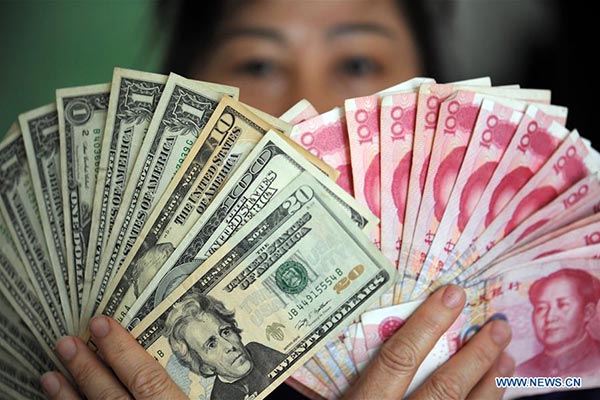US-traded Chinese shares fall on uneasy comeback
By Dai Tian (chinadaily.com.cn) Updated: 2016-05-10 14:56
 |
|
A residents shows China's yuan and US dollar banknotes in Qionghai, South China's Hainan province, Jan 7, 2016. [Photo/Xinhua] |
Chinese firms listed in the United States hit Monday blue, with shares slumping for fear that their plan to go private and relist at home may be tougher to deliver.
Internet services provider Qihoo 360 Technology Co, social platform YY Inc and dating app Momo Inc sank more than 10 percent on Monday on rumors that China's securities watchdog is mulling stricter rules on US-traded companies' return to A-share market.
The China Securities Regulatory Commission said on Friday it is putting closer scrutiny on reverse mergers, a previously fast track for firms resorting to land on home market by injecting their assets to a shell company acquired.
The latest expectation is that regulators may require overseas-delisted companies to wait for about a year before seeking A-share backdoor listing, an anonymous investment banker at Huatai Securities told 21st Century Business Herald.
The source added that securities watchdog may also set a ceiling on price-to-earnings ratio or restrict assets that companies can inject to the listed entity.
Data center services provider 21Vianet Group Inc nosedived 24 percent on Monday, marking its biggest plunge since it announced a delisting plan in June last year.
Baidu edged down for a third day, as regulators demanded the search engine giant to overhaul its healthcare advertisements display after a 21-year-old college student who died last month of a rare form of cancer accused the hospital and Baidu of providing misleading information about the treatment.
JD.com Inc, the country's second largest e-commerce site, tumbled 7 percent on Monday, after reporting a less-than-expected results. The company's net loss attributable to ordinary shareholders rose 28.1 percent to 909.8 million yuan ($141.1 million) in the first quarter of 2016.
Sina and Weibo lost 4.4 and 5.6 percent respectively on Monday.
Li Xiang contributed to this story.
- US-traded Chinese shares fall on uneasy comeback
- Chinese economy to grow 6.7% in Q2: think tank
- Intricate pictures carved on porcelain
- Qingdao port sees unprecedented congestion due to oil imports
- Baidu's objectivity compromised by profit model: investigation
- Taobao to crack down on fake luxury items from May 20
- Facebook wins a trademark suit in China
- China producer prices down 3.4% in April

















